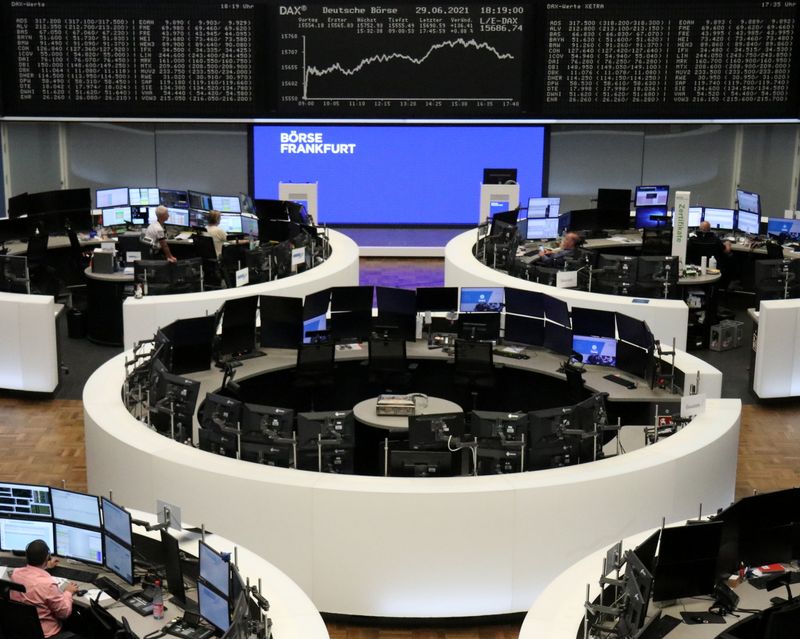By Mike Dolan
LONDON (Reuters) - A year ago, investment circles were abuzz about an eastward leap across the Atlantic. But that stock market trade has yet to bear fruit - undermining advice to do it yet again this year.
At midsummer 2020, many investors began a switch to cheaper European equity from seemingly overvalued U.S. indices highly concentrated in tech firms reaping lockdown windfalls.
The rotation seemed to make sense as the post-pandemic recovery broadened and the U.S. election loomed.
And yet fresh waves of COVID-19 through the Northern winter and November's clean sweep for high-spending U.S. Democrats blotted the performance of this trade ever since.
To be fair, the euro zone's main benchmark kept pace with Wall Street's S&P500 - both gaining about 38% in dollar terms since June 30 last year.
But other measures are less flattering. Britain's FTSE100 lagged both of those by 10 percentage points, with UK stocks a drag on the wider Europe STOXX 600. The U.S. small-cap Russell 2000 starred with gains of 62%, while the Nasdaq 100 stayed ahead of most with a jump of 43%.
A year on - emboldened by vaccination and strengthening economic output and earnings growth - the case for the eastern side of the pond and its more cyclical firms and cheaper "value stocks" is being be made once again.
Goldman Sachs (NYSE:GS) points out that mutual fund flows into European stocks this year have been their strongest since 2015.
But inflows to all equity markets are zooming higher everywhere and the relative picture is far less clear.
The main problem, according to Goldman, is not attraction of Europe to foreigners. European equity held by U.S. investors alone has almost trebled to 28% over 20 years and overseas investors at large hold 43%.
The big problem is closer to home. Due to regulatory and demographic factors and greater risk aversion, Europe's funds and households stay loaded with bonds and cash - with pension and insurance funds owning just 3% of European stocks.
Much of that won't change overnight.
A robust European recovery - which saw euro zone economic sentiment rise in June to its highest reading in 21 years - might help.
What's more, simmering fears of a hit to tech-heavy U.S. indices from global minimum tax agreements and rising antitrust pushbacks against "Big Tech" speaks loudly to some rebalancing.
But even here, echoes of 2020 can be detected. Fears of new COVID variants threatening another European summer tourist season are a reminder against betting on premature ends to the pandemic and the biggest politic risk in the third quarter probably resides with German federal elections in September.
The re-emergence of dollar strength against the euro - as the Federal Reserve leans hawkish while Europe's central banks pointedly do not - is another warning shot across bows.
EVERLASTING BULL?
But those willing to take a pace back from the news flow may yet be rewarded.
JPMorgan (NYSE:JPM)'s long-term strategists Jan Loeys and Shiny Kundu doubt the case for endless U.S. outperformance.
"History warns against everlasting bull markets," they wrote, arguing the case for strategically underweighting U.S. stocks and showing evidence of mean reversion in relative 10-year U.S. returns versus the rest of the world over decades - coming from reverals in earnings, the dollar and tech sector.
Their conclusion is that people are probably just too overloaded now in American stock and see a good case to hold at least a little less U.S. equity than its massive 58% weighting in MSCI's all-country index. The U.S. economy itself is just a quarter of global economic output by comparison.
That high MSCI weighting follows relentless outperformance for more than a decade since the banking crash of 2008, as borrowing costs stayed low and the digital revolution gathering pace via U.S.-based but quintessentially global tech companies.
Any diversification gain for investors from being elsewhere was more than offset by better returns on U.S. stocks.
But stretching the sample back 50 years, the JPM research showed 75% of rolling 10-year U.S. outperformance or underperformance was reversed the following decade.
With equity valuations in non-U.S. markets relative to U.S. stocks at an all-time low, a reduction of U.S. weightings in global portfolios to about 50% may be warranted, Loeys and Kundu wrote. And the balance would be best moved to other developed stocks rather than emerging markets now clouded by ebbing potential growth rates.
With Europe accounting for as little as 17% of MSCI's all-country index, the mean reversion argument points there.
And yet many remain wary of Europe's "cheapness" and question whether it can take up the slack - pointing to poor relative profitability and margins at European companies compared to U.S. firms and a glaring absence of an equivalent tech sector.

Stephen Jen at hedge fund Eurizon SLJ reckons he sees no clear fundamental arguments why European profit margins would rise from here. What's more, demographics - where Europe's profile is only about 20 years behind Japan's - would continue to see the euro zone savers re-cycle the bloc's current account surpluses overseas, just like Japan has done for decades.
"The market’s current fixation on the likely speed of the economic rebound in the coming months seems misplaced," he said. "The debate ought to be on what might happen beyond the cyclical bounce virtually every economy is experiencing sooner or later."
(By Mike Dolan, Twitter: @reutersMikeD. Charts by Thyagu Adinarayan; Editing by Lisa Shumaker)